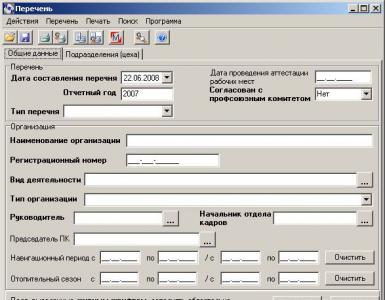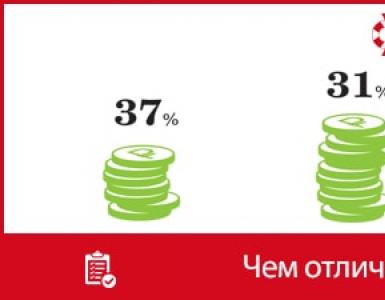Business informatics or information security, please advise. Business informatics (specialty)
The core subject when entering a university to major in computer science is mathematics, as well as physics and ICT. On average in Russia, for admission it is enough to score in these subjects and the Russian language on the EGE from 35 to 80 points. The passing score depends on the prestige of the educational institution and the competition within it. Sometimes, at the discretion of the university, knowledge of foreign languages may be required for admission.
Specialty "applied computer science"
The most modern, progressive and promising direction in the study of IT is applied computer science. This is an innovative direction that involves a creative approach during subsequent work in the specialty “applied computer science”.
The code of the specialty "Applied Informatics" is 03/09/03. It is also called computer science ICT. The specialty is studied at many faculties - economics, law, management and education, as an additional subject. The specialty involves the study of programming languages and foreign languages, but the emphasis is on the practical application of these skills in various information systems.
Specialty "Business Informatics"
According to the classifier "Business Informatics" the code is 38.03.05. This specialty is quite new and appeared only in 2009. Accordingly, when choosing the specialty “business informatics”, who to work for a student is an important question. Business informatics allows you to obtain qualifications as a designer, optimizer and administrator of systems and processes of business programs.
In order for a student to be able to obtain a specialty in business informatics, universities teach how to conduct analytics, plan and organize IT projects of various levels of complexity. In addition to logical thinking and a technical mindset, students in the direction of 03.38.05 are required to have analytical skills, communication skills and leadership skills.
Specialty "Informatics and Computer Science"
Under the code 09.03.01 in the classification is the specialty "Informatics and Computer Science". Everyone decides who to work with such qualifications for themselves, based on the acquired knowledge in the areas of software development, IT design and information security. During the training period, students master high-level programming languages, and OS and local network administration skills.
Training in the direction of 03/09/01 takes 4 years. Despite the relatively short training period, the field of “Informatics and Computer Science” is considered one of the most difficult, since it involves acquiring skills for developing programs and algorithms.
Specialty "applied computer science in economics"
Applied computer science with an emphasis on economics is a subsection of “Mathematical support and administration of information systems” 03/02/03 for bachelor’s degrees and 04/02/03 for master’s degrees. Computer science with the additional specialty of “economist” allows you to create, implement and maintain software in the field of economics, analyzing its operation and algorithms.
A student who has received an education in the field of “applied computer science in economics” is able to solve functional problems and operate financial and material flows using special software.
"Mathematics and Computer Science" - specialty
Applied mathematics and computer science is a specialty in universities according to code 01.03.02 in bachelor’s programs and according to code 01.04.02 in master’s programs. In contrast to narrow specialists in the fields of economics, education and law, “Mathematics and Computer Science” allows you to apply the acquired skills in any work that involves the use of software, ICT, communication networks and systems, and conducting mathematical calculations. The student will be able to apply the acquired skills in analytical, scientific, design and technological fields.
Computer science and control systems - specialty
At the department of "Informatics and Control Systems" the directions of the section "Informatics and Computer Science" are studied 09.00.00. Students gain skills in the areas of 3D modeling, WEB development, information security technology, design of intelligent control systems and development of microprocessor systems.
Computer science and statistics - specialties
The Department of Computer Science and Statistics allows students to obtain qualifications in the specialties of the Information Security section 10.00.00. The department teaches special disciplines that are aimed at ensuring information security in specialties 10.05.01-05 and interaction with relevant software.
"Fundamental computer science and information technology" - specialty
The bachelor's level specialty in the direction 02.03.02 "Fundamental computer science and information technology" is aimed at system mathematical programming, information processing and management of communication systems. In addition to programming, the student gains knowledge in the areas of design and sound processing, and can manage telecommunications objects.
Institutes specializing in computer science
There are more than 50 universities in Russia that offer training to students in computer science fields.
At Russian institutes you can gain skills to work as a programmer, developer, information systems engineer, designer, and administrator of local and WEB networks. The specialty of computer science teacher is also being studied at universities at the master's level, in the areas of 04/02/01 and 04/09/02.
College - specialty "applied computer science"
The specialty “applied computer science” at the college was not included in the list of specialty codes from 2015. Training in applied computer science on the basis of a diploma gives graduates the right to obtain the qualification “Programmer Technician” without passing the Unified State Exam. The training lasts 3-4 years and opens up opportunities to work in any enterprise as a programmer.
Where can you work in computer science?
One of the most popular technical specialties nowadays is computer science. Therefore, many graduates who receive high scores in mathematics choose the IT field. Specialties related to computer science can be divided into fundamental, applied and additional.
Depending on the choice, the student learns to interact with various systems at stages from development to administration and practical use in various computing areas.
You might be interested.
In-demand specialties and prestigious jobs always arouse a certain interest in modern society. So, in particular, more and more Internet users are wondering what business informatics is, what kind of profession it is, what they do after training, and so on. If you pay attention to the definition, then business informatics is an area directly related to information and communication systems of modern economic activity. In fact, this science is engaged in the development of such systems, their design and implementation in various areas. Also, business informatics is directly related to conceptual management, economics and computer science.
The current interest in business informatics is also explained by the fact that this specialty is relatively new and has only recently appeared in the field of higher education. Most universities opened this specialty only five years ago, almost immediately after the adoption of the corresponding state standard for this area of training students. Currently, training at the Department of Business Information Systems for Production Management is quite realistic and affordable for most applicants.
Many people know the expression “Demand creates supply.” This statement turned out to be true in this case as well. Business informatics arose due to the urgent need for relevant specialists, namely those workers who could analyze information systems at a sufficient professional level, work with information and communication technologies, develop similar systems, thereby increasing business productivity, its efficiency and level.
Society has long since confidently moved from the field of industrial development towards information technologies, which have penetrated into many key areas of human activity in society. As a result, an urgent need arose for specialists who, in addition to traditional disciplines such as economics, law, management, marketing, and so on, could understand the field of information technology development.
More about business informatics
 So, business informatics, what kind of profession is it? We can say that this area of science combines several directions at once. Here are some of them:
So, business informatics, what kind of profession is it? We can say that this area of science combines several directions at once. Here are some of them:
However, we should not forget that in the educational structure, business informatics is a completely new educational process. In addition to traditional disciplines, the central place in it is entirely occupied by learning to achieve assigned tasks thanks to modern computer technologies, which today are in demand in almost all sectors of business.
Business informatics specialists, in fact, must have an excellent understanding of the latest tools available on the modern software market, while also having a good understanding of the economic sphere of activity, understanding the finances of various enterprises and marketing as such.
Read more about business informatics
First of all, it is worth noting that business informatics specialists must not only remain competent in their business, but also work professionally in the following main areas of activity:
Trained specialists will be able to perform the functions of analysts of a wide range of information systems, they should be able to work as IT consultants (here this means organizing innovative business approaches in the areas of information technology), and such workers will also be able to draw up projects of information systems of varying degrees of complexity, implement them in office work, and perform functions organizational management of CIS (corporate information systems), management management.
Now it becomes clear why the demand in the world of work is growing precisely for those masters of their craft who have mastered the profession of business informatics. Where to work in the future is not a question, since the diploma obtained opens up very wide employment opportunities. At the moment, this is serious competition for less in demand specialists in the humanities, the demand for which is steadily and invariably decreasing.
If we talk about the principles of work, it is worth noting that a business computer scientist works quite thoroughly with the so-called professionally oriented environment (a shell consisting of certain software elements and information support). It all starts with the creation of a project and ends with the features of implementing this shell into a business. In addition to the above, the professionally oriented environment developed by a business informaticist includes organizational tools aimed at improving work functions and processes of economic activity.
Areas of use
 What the profession of business informatics is now becomes clear. Next, let's talk a little more specifically about the jobs themselves. Simply put, specialists in the above-mentioned specialty will find application everywhere:
What the profession of business informatics is now becomes clear. Next, let's talk a little more specifically about the jobs themselves. Simply put, specialists in the above-mentioned specialty will find application everywhere:
As you can see, specialists in the field of business informatics are in demand in the modern labor market. Therefore, this area of study remains quite promising and interesting.
Today, a huge number of questions have increased regarding what business informatics is, who to work with and why it is interesting? If we start with a description of this area, then we can say with confidence that business informatics is one of the youngest specialties related to the field of higher education. Undoubtedly, such a profession directly affects a very promising sector of modern activity. The specialty was formed against the background of management development, progress in the field of economics and due to the widespread use of information and communication technologies by the public.
Where does the learning process begin?
From the very beginning, it is necessary to understand who business informatics work, how they work, and what they do? It is worth, first of all, paying attention to the material being studied in this specialty. At the beginning of training, which implies the initial stage of preparation, the greatest attention is paid to the natural sciences and other disciplines that lay the foundations in the field of information technology. In particular, the training course is closely related to such subjects as:
In addition to the above, initial education includes general mathematical disciplines. Among the required subjects, students will meet:

Then the question comes down to the economic environment. Training for a future profession involves studying and conducting financial and management accounting, basic economic theories and many other subjects related to the humanities.
In principle, what the profession of business informatics means and who to work with later is already becoming clear. However, that's not all. In the third and fourth years, training will go deeper into such areas of special disciplines as:
Of course, the classes that students receive in the early stages remain basic and differ mainly in that they relate to the theory of the subject. However, much attention in training is paid to the methodological process, which is directly related to the implementation of enterprise automation, to the design, implementation and further operation of information systems. As for the latter, students will have the opportunity to learn how to develop and operate information systems, as well as how to manage and organize an information and communications technology service.
Practice and work for bachelors
Practice in the field of business informatics largely depends on trainings that allow you to master all kinds of tools, programs and systems, which in turn will allow you to put into practice the knowledge acquired during the study of the theoretical basis. This includes Delphi, MS Project, Dot net and much more.
Where can bachelors majoring in business informatics work? Specialists who have received this degree have the right to work as part of the executive working group. In addition, they can work as managers of various service departments and similar systems. In fact, a bachelor of business informatics is a professional worker who can design, create, implement corporate information systems, as well as carry out analysis and the necessary support.
Demand for specialists
 Speaking about the types of professional activities, it is worth noting that according to statistics and expert assessments, the Russian market currently needs more than 150,000 lawyers, economists and managers who would be directly related to information and communication technologies, while the above-mentioned needs for specialists of similar profile is currently only partial. For Russia this is approximately 10,000 people annually. With such a growth rate of vacancies and employees, we can confidently assume that business informatics specialists will be needed for a long time and in many areas of activity at once.
Speaking about the types of professional activities, it is worth noting that according to statistics and expert assessments, the Russian market currently needs more than 150,000 lawyers, economists and managers who would be directly related to information and communication technologies, while the above-mentioned needs for specialists of similar profile is currently only partial. For Russia this is approximately 10,000 people annually. With such a growth rate of vacancies and employees, we can confidently assume that business informatics specialists will be needed for a long time and in many areas of activity at once.
In addition, it is worth noting that broader prospects open up for bachelors of business informatics, in particular, work in the profession abroad, since according to the Bologna Declaration, the diploma obtained will be valid for an unlimited time and in any country that is a participant in this process. This is just some information that allows you to understand what a wide and sought-after range of activities the specialty of business informatics brings with it. Where to work later is up to you to decide!












